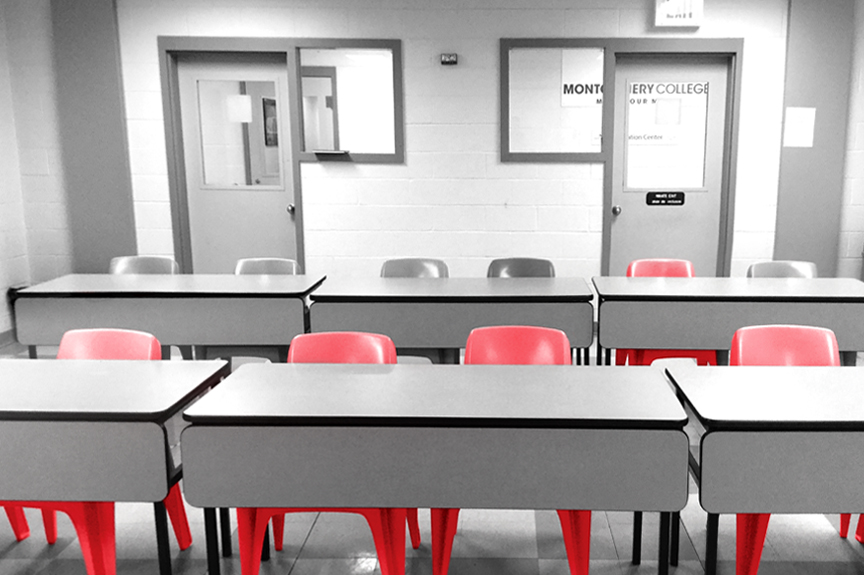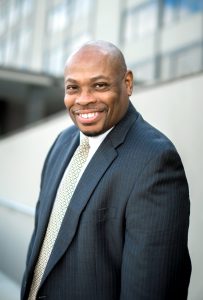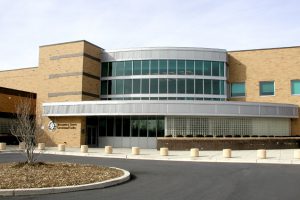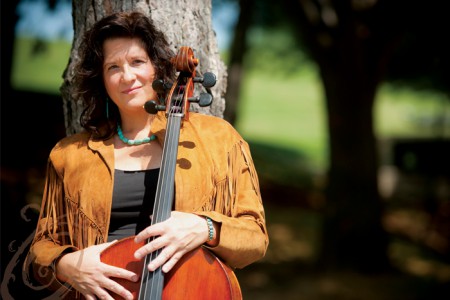Doing Time Wisely
 Montgomery County inmates hit the books, earn GEDs with MC instruction on site at the Montgomery County Correctional Facility in Boyds.
Montgomery County inmates hit the books, earn GEDs with MC instruction on site at the Montgomery County Correctional Facility in Boyds.
Nine out of ten people incarcerated in the US eventually return to their community, and once they do, those who received education while incarcerated are 43 percent less likely to end up back in a correctional facility, according to a 2014 study by the RAND Corporation. That means better futures for them and less crime in the community.
Following the MC mission to empower students to change their lives and enrich the life of our community, MC agreed to run the adult education program for the Montgomery County Department of Correction and Rehabilitation (MCDOCR) in 2016. Since taking over the program, the annual number of Montgomery County inmates who earn a GED in jail has more than doubled.
While teaching in a correctional environment has its challenges, MC instructors are rising to the occasion in what is proving to be a powerful partnership between MC and MCDOCR that continues to expand.
“We are totally pleased with Montgomery College’s abilities,” said Gale Starkey, deputy warden of inmate programs and services for the Montgomery County Correctional Facility (MCCF), a maximum-security jail located in Boyds that houses both male and female inmates.

MC instructor David Reed has been teaching Pre-GED and GED-level courses at the Montgomery County Pre-Release Center since May 2018. He is a former high school teacher who also used to work with juvenile offenders. Photo by Pete Vidal.
MC instructors teach classes at MCCF six hours a day, Monday through Friday, in the Model Learning Center, a section of the jail with classrooms, a computer lab, and a library. Instructors also teach at the Montgomery County Pre-Release Center, a minimum-security facility in Rockville, Maryland, that helps people nearing the end of their sentence prepare to reenter society.
MC also gives anyone in the program who earns their GED before release a $1,500 scholarship to continue their education at MC when they get out, and instructors provide counseling on how to enroll and register.
A key feature of MCCF is that it is a county jail, not a prison—the difference being that county jails only house people who are awaiting trial or have a sentence of fewer than 18 months. Most of the inmates in MCCF are pretrial, meaning they haven’t actually been convicted and sentenced.
“Developing a consistency with regards to teaching is the biggest challenge because the population can change every week,” says Franklin Moore, MC’s program director for the Model Learning Center. “It happens sometimes that someone might take three of the four sections [of the GED test], and then on the day they are supposed to take the final section they are gone,” which means he or she went to court and was either released or sentenced to prison.
Nevertheless, in the two-and-a-half years since MCDOCR partnered with MC, 89 people have completed their GED. Before, the annual number of GEDs was usually in the single digits.
In addition to GED prep and testing, MC also provides Adult Basic Education for those at or below a sixth-grade level; Pre-GED courses for those who don’t need ABE but aren’t quite ready for GED prep; English as a Second Language courses; Digital Literacy training that teaches basic computer skills; and two certificate programs.
MC added the two certificate programs in 2017 in response to inmates expressing interest in pursuing jobs in hair care and food service. Since then, 37 inmates have earned one of the certificates.
While it might seem like a jail would not be an ideal learning environment, with MC’s experienced adult education instructors, MCDOCR’s excellent facilities, and an average class size of seven to 10, the Model Learning Center actually has some advantages over many “normal” adult education programs.
“Here it is more intimate and there is a lot more coaching, where we want people to feel motivated and build their confidence,” Moore says. “They are getting individualized instruction they probably wouldn’t get elsewhere. A lot come thinking that it will not last and they surprise even themselves when they realize they can do it.”

The Montgomery County Correctional Facility, a maximum security jail located in Boyds, Maryland, houses both male and female inmates. MC agreed to run the adult education program for the Montgomery County Department of Correction and Rehabilitation in 2016. Since taking over the program, the annual number of county inmates who earn a GED in jail has more than doubled. Photo courtesy Montgomery County Department of Corrections.
One such student is Anton Powell, who earned his GED at MCCF in 2016 and was valedictorian of his graduating class.
“This diploma is sincerely appreciated since graduation is something I never thought would ever happen,” said Powell during his speech at a graduation ceremony held inside the jail. “After years of struggle, I can finally say I made it.”
Motivated by this accomplishment, Powell said once he gets out he plans to earn the certifications necessary to start his own heating, ventilation, and air conditioning (HVAC) business.
While Powell is proud to speak publicly about his journey, other former inmates prefer not be named in an article like this one because they are justifiably worried that the stigma of having been to jail could affect their ability to find jobs and be accepted in the community. This includes two students who earned their GED at MCCF and went on to pursue their associate’s degree at MC after leaving. One just graduated in May, and the other is set to graduate in December.
Clearly, even though a degree can open doors previously closed as tightly as the steel ones at MCCF, a former inmate trying to turn his or her life around still has many obstacles to overcome. Some of these obstacles become even clearer when you consider the challenges faced by MC instructors who teach at the Montgomery County Pre-Release Center (PRC) in Rockville.
MC provides Pre-GED courses, GED prep, and Digital Literacy training to the residents of PRC, who are called “residents” rather than inmates because they are allowed to leave the facility during the day, usually to go to a job or to take other classes. Residents don’t come exclusively from MCCF, but other facilities as well including prisons, where some may have been incarcerated for only two days before transferring to PRC, while others may have been in for as long as 20 years.
Only those who have demonstrated good behavior during their incarceration are able to go to PRC. Coupled with the fact that they are so close to freedom, this might lead one to assume teaching there is less challenging because the students are more likely to be well behaved and focused. However, the opposite can actually be true for reasons that are as troubling as they are counterintuitive.
“What makes them sometimes still act up even though they’re so close is fear of release,” says Ben Stevenson, deputy chief of programs and services for PRC. “Some are comfortable in the jail [or prison] and they don’t know what they will do when they get out,” he said, explaining that such residents can grow more likely to act out as their release date approaches in an attempt (conscious or otherwise) to be sent back rather than suffer failure again in the outside world.
 Stevenson says education can build confidence and help with fear of release, but only if the teacher is able to earn the residents’ trust, which is why he is thankful to have MC instructor David Reed.
Stevenson says education can build confidence and help with fear of release, but only if the teacher is able to earn the residents’ trust, which is why he is thankful to have MC instructor David Reed.
“Besides David being an excellent instructor, I haven’t had stability like I’ve had since he came here,” said Stevenson. “A lot of instructors sometimes just come in and are dealing with behavioral issues and just managing the class. David has done a great job with those difficulties by building a rapport with the students and creating an effective learning environment.”
Stevenson explained that many residents have had bad experiences with teachers in the past and think they’ll be made to feel embarrassed about what they don’t know. The intimate coaching environment that instructors like Reed cultivate can be the first time some have had a teacher treat them with respect and encouragement.
“I think what it is that they want is somebody to care for them. Somebody to care for their process of learning,” Reed said. “What works with the residents, and anybody that I have taught, is they need to have structure.”
Unfortunately, educators like Reed are hard to come by, as MC is currently struggling to fill three open instructor positions. Qualified applicants sometimes misunderstand the job announcement and don’t realize until their interview that the position is in a correctional facility, according to Nancy Newton, MC’s special program director who oversees the contract with MCDOCR. They have had applicants withdraw their applications, she says.
Despite the challenges, Newton sees more opportunities than setbacks in building inroads to deliver educational opportunities for student inmates. MC continues to work with MCDOCR to expand the adult education program and is currently exploring bringing college-level courses to MCCF.
As Anton Powell said at the end of his valedictorian speech, “We are not going to get very far in life based on what we already know. We’re going to advance in life by what we’re going to learn as we move into our future.”
— Shane Doyle ’10 ’15
Photos by Shane Doyle ’10 ’15 and Pete Vidal








I know this is an excellent idea. Because of the statistics if you dont teach them how do you expect them rehabilitate themselves. Thank you mc instructor David Reed. I appreciate the fact that you are looking back to help. Please continue. Each one reach one, then each on reach one.